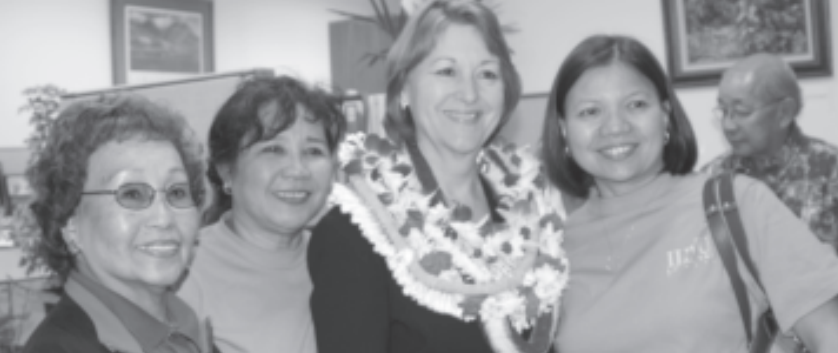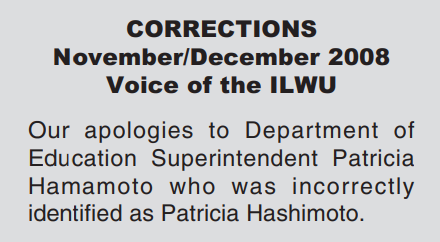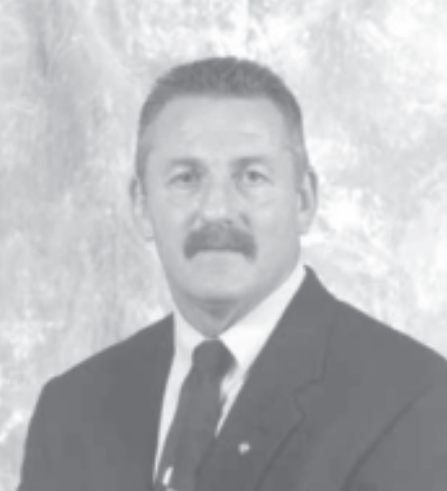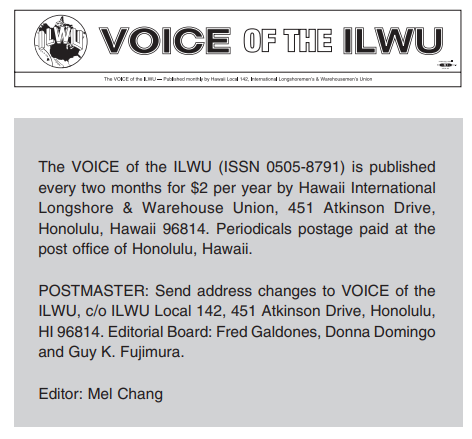ILWU union political action will focus on passing legislation in five areas during the 2009 Legislative Session. The top priority will be the passage of an Employee Free Choice Act for union recognition. This came close to passing in 2008 but failed to get enough support to override Governor Lingle’s veto.
1. Employee Right to Join Unions. Provides for card check union recognition under the Hawaii Labor Relations Act and for mediated and arbitrated first contracts. This change would provide an alternative to the secret ballot elections under current law, which allows some employers to abuse the process and prevent a fair election.
2. Employee Retention. Provides for workers to retain their jobs when companies are purchased, when ownership or management changes, when a lease is transferred, or when assets are sold and/or transferred and the business operations continue in a similar mode as under the previous owner or management. The US lags far behind most Western European countries, which have strong laws that protect worker’s rights and jobs.
3. Protect Workers Compensation. Maintain the existing “presumption clause” in the Workers’ Compensation law. Provide that injured workers continue to receive workers’ compensation benefits (wages and medical treatment) during any period that their claim is being investigated or under appeal. Provide for timely payments when a claim is made. Provide that if an injured worker is denied compensability and then wins compensability on appeal, the cost of the appeal will be paid by the insurance carrier. Address problem of physicians declining to treat Workers’ Compensation cases because of the paperwork and/or the medical fee schedule. Establish panels of medical providers from which the claimant and insurer shall mutually elect a physician to perform an Independent Medical Examination (IME). A rating shall not be performed at the same time as the IME.
4. Harbor Development. Strong support for harbor development throughout the State of Hawaii. Waterfront development must prioritize the need to provide for growing manifested cargo operations and not compromise the safe working conditions for the employees.
5. Senior Programs. Strong support for programs that benefit senior citizens.
Hawaii Division is also strongly supporting priority funding of buildings already under construction for the Hawaii Community College in West Hawaii (Kona).
All legislators are given a copy of the entire ILWU Legislature Program for 2009 which contains 97 points that cover a wide range of issues such as education, health and social programs, economic development, protecting the environment, civil rights, culture and the arts.

ILWU members and retirees from each island work in teams to visit their representatives on the opening day of Hawaii’s State Legislature on January 21, 2009. Their presence reminds lawmakers that the union has a strong and active political action program and will be watching what the Legislature does. Maui Division’s Ruby Yoshisato, Perlita Manlansing and Lourdes Rivera with Senator Roslyn Baker (second from right).
Thoughts about the New Year
Like most of us, the New Year has me thinking about the challenges that we’ll be facing ahead in 2009, and reflecting back on the ILWU’s accomplishments during the past year.
Everybody’s worried about the economy as we enter 2009, and for good reason. Things are bad and getting worse. As I write this in midDecember, more than one million workers have lost their jobs in the past three months. With so many people out of work, most of us know someone who’s recently lost a job or can’t find one. In the ILWU, we’re hearing about plants and warehouses that are closing. The ports have fewer ships and less work than a few months ago. Everyday there’s more news about cutbacks, closures, and consolidations. Most working families are either hurting or scared about the future.
When somebody loses a job, it hits a family hard, but the damage goes much deeper. With fewer people working, less revenue in company coffers, and the stock market at record lows, our health and retirement funds are under pressure. Everyone with a 401(k) knows what it’s like to see half your nest egg disappear. And while the defined benefit pensions that many of us have are a lot better than a 401(k), nobody’s pension and welfare plan is immune from a volatile stock market.

The economic damage caused by George W. Bush and his free-market followers – in both political parties – has been staggering. The war in Iraq alone will cost us three trillion dollars. And when you include all the losses from unemployment, home foreclosures, personal and business bankruptcies, and a falling stock market, the total is mind-boggling.
With all this doom and gloom, most of us cannot wait for President Obama and his family to move into the White House, so we can start putting people back to work, providing health care to all Americans, getting out of Iraq, and passing the Employee Free Choice Act (EFCA). It’s a very tough economic time to accomplish all these goals, and President Obama will need our support.
I wonder if there isn’t more we could do to ease the pain of this recession in our ILWU family, especially among workers who have dispatch halls.
I think part of the answer comes from studying the situation Harry Bridges faced in 1934. The stock market had crashed in 1929 and the United States was trying to recover from a depression. The unemployment rate was 25 percent and workers were literally fighting each other over jobs. On the waterfront, employers used the “shape-up” system to pick who they wanted for each shift, often with payoffs and favors.
But a man named Harry Bridges won support from his co-workers with a simple, but remarkably powerful idea: organize the men, form a union, and demand a dispatch hall that would allocate the jobs fairly and equally. Think about it. The hall is a place to go when your job is completed. Most people report to their state unemployment office when they’re laid-off and no longer needed by their employer. Being released to the dispatch hall is not a penalty, but a hard-fought privilege. This year on July 5th, we’ll celebrate 75 years of ILWU history. We honor the men who fought and died for the right to dispatch themselves fairly and equally, regardless of who you were, who you knew, the color of your skin, or the country you came from. The system allowed every man a day’s work. These principles became the foundation of our ILWU union.

Today these principles are more important than ever. Our economy is in a tailspin, and we all must take a long hard look at what’s happening in our own house. For example, is it fair for an individual to have two jobs in one day, when others cannot get even one? It’s easy to make a political issue out of the situation, to sit back and endlessly argue the problem. However, the work opportunities are likely to get worse before they get better. We all like to say that we’re “good union people” in good times. Well, these are the times when we will be tested. This recession may be the deepest our present union members have ever experienced. It’s time to ask yourself, “Is it fair for me to have two jobs in one day when others don’t get even one?” Our union must be prepared to re-affirm the principles established by Harry Bridges. I urge each local and individual to adhere to the spirit of fairness that founded our union, put personal gain aside, and take care of each other. “An injury to one is an injury to all.”

